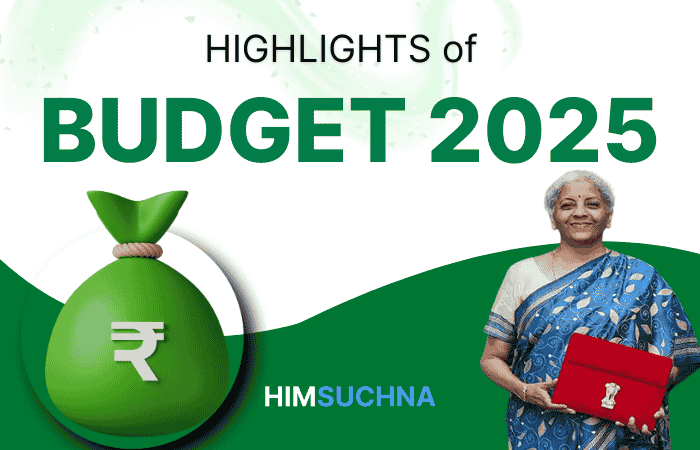Union Budget 2025 Highlights – Budget 2025
The Union Budget 2025-26 is a crucial financial document that outlines India’s economic trajectory for the upcoming fiscal year. The budget provides a comprehensive view of revenue generation, expenditures, fiscal deficit, and resource allocation across various sectors. This article delves deeply into the budget’s key aspects, including its overall financial structure, sectoral allocations, and economic implications.
Read in Hindi: Union Budget 2025 Highlights in Hindi – Budget 2025 in Hindi
1. Budget Overview and Fiscal Indicators
The total expenditure for 2025-26 is projected at ₹50,65,345 crore, marking a steady increase from ₹47,16,487 crore in 2024-25 (Revised Estimates). The budget also highlights significant capital expenditure and resource transfers to states.
Fiscal Deficit & Revenue Deficit
| Indicator | 2023-24 (Actuals) | 2024-25 (RE) | 2025-26 (BE) |
|---|---|---|---|
| Fiscal Deficit | ₹16,54,643 Cr (5.6%) | ₹15,69,527 Cr (4.8%) | ₹15,68,936 Cr (4.4%) |
| Revenue Deficit | ₹7,65,216 Cr (2.6%) | ₹6,10,098 Cr (1.9%) | ₹5,23,846 Cr (1.5%) |
| Primary Deficit | ₹5,90,771 Cr (2.0%) | ₹4,31,587 Cr (1.3%) | ₹2,92,598 Cr (0.8%) |
🔹 Key Observations:
- The Fiscal Deficit has been reduced, indicating improved financial management.
- Revenue Deficit is also projected to decline, demonstrating better revenue performance.

2. Sources of Government Revenue
The total estimated receipts for 2025-26 are ₹50,65,345 crore, with a significant portion coming from tax revenues and borrowings.
Revenue Breakdown
| Source | 2023-24 (Actuals) | 2024-25 (RE) | 2025-26 (BE) |
|---|---|---|---|
| Tax Revenue (Net to Centre) | ₹23,27,251 Cr | ₹25,56,960 Cr | ₹28,37,409 Cr |
| Non-Tax Revenue | ₹4,01,785 Cr | ₹5,31,000 Cr | ₹5,83,000 Cr |
| Capital Receipts | ₹17,14,411 Cr | ₹16,28,527 Cr | ₹16,44,936 Cr |
| Borrowings & Other Liabilities | ₹16,54,643 Cr | ₹15,69,527 Cr | ₹15,68,936 Cr |
🔹 Key Observations:
- Tax revenue is estimated to grow, reflecting increased tax compliance and economic growth.
- Non-tax revenue sources, including dividends and telecom spectrum sales, are expected to rise.

3. Government Expenditure Allocation
The total expenditure is categorized into revenue and capital expenditure, with a focus on infrastructure, defense, and welfare programs.
Major Spending Areas
| Category | 2023-24 (Actuals) | 2024-25 (RE) | 2025-26 (BE) |
|---|---|---|---|
| Interest Payments | ₹10,63,872 Cr | ₹11,37,940 Cr | ₹12,76,338 Cr |
| Defense | ₹4,44,699 Cr | ₹4,56,722 Cr | ₹4,91,732 Cr |
| Education | ₹1,23,365 Cr | ₹1,14,054 Cr | ₹1,28,650 Cr |
| Health | ₹81,594 Cr | ₹88,032 Cr | ₹98,311 Cr |
| Agriculture & Rural Dev. | ₹2,41,193 Cr | ₹1,90,675 Cr | ₹2,66,817 Cr |
| Infrastructure (Transport) | ₹5,26,765 Cr | ₹5,41,384 Cr | ₹5,48,649 Cr |
🔹 Key Observations:
- Defense spending has increased, emphasizing security and modernization.
- Education & healthcare continue to receive higher allocations.
- Rural development sees a notable rise to support livelihood programs.

4. Key Schemes and Sectoral Allocations
a. Infrastructure & Transport
- Jal Jeevan Mission: ₹67,000 Cr for rural drinking water.
- Pradhan Mantri Awas Yojana (PMAY-Urban & Rural): ₹74,626 Cr for housing development.
- National Highway Development: Increased capital outlay for road projects.
b. Agriculture & Rural Economy
- PM-KISAN: ₹63,500 Cr for farmer income support.
- Fertilizer Subsidy: ₹1,67,887 Cr to support farmers.
- Mahatma Gandhi NREGA: ₹86,000 Cr for rural employment.
c. Social Welfare & Employment
- Ayushman Bharat (PMJAY): ₹9,406 Cr for healthcare coverage.
- National Education Mission: ₹41,250 Cr for school education.
- Skill India & Apprenticeship Programs: ₹3,000 Cr for job training.

5. Transfers to States & Union Territories
The total resources transferred to states amount to ₹25,01,284 crore, with significant increases in state share and grants.
| Category | 2023-24 (Actuals) | 2024-25 (RE) | 2025-26 (BE) |
|---|---|---|---|
| Devolution to States | ₹11,29,494 Cr | ₹12,86,885 Cr | ₹14,22,444 Cr |
| Finance Commission Grants | ₹1,48,522 Cr | ₹1,27,146 Cr | ₹1,32,767 Cr |
| Centrally Sponsored Schemes | ₹5,71,343 Cr | ₹6,04,478 Cr | ₹7,17,042 Cr |
🔹 Key Observations:
- Higher state transfers to promote decentralized growth.
- More funds for Centrally Sponsored Schemes like PMAY, MGNREGA, and NHM.

6. Deficit Financing and Borrowings
The budget plans lower market borrowings and improved fiscal consolidation.
Sources of Deficit Financing
| Source | 2023-24 (Actuals) | 2024-25 (RE) | 2025-26 (BE) |
|---|---|---|---|
| Market Borrowings | ₹11,77,754 Cr | ₹11,62,678 Cr | ₹11,53,834 Cr |
| Small Savings Schemes | ₹4,51,399 Cr | ₹4,11,872 Cr | ₹3,43,382 Cr |
| External Debt | ₹55,121 Cr | ₹31,992 Cr | ₹23,490 Cr |
🔹 Key Observations:
- Lower reliance on external debt, indicating self-sufficiency.
- Reduced market borrowings to maintain financial stability.
Conclusion
The Union Budget 2025 presents a balanced approach focusing on growth, fiscal consolidation, and social welfare. Key takeaways include: ✔️ Higher capital expenditure for infrastructure. ✔️ Focus on rural development, health, and education. ✔️ Reduced fiscal deficit, ensuring macroeconomic stability. ✔️ Increased transfers to states for cooperative federalism.
This budget aims to strengthen India’s economy with inclusive growth, emphasizing long-term sustainability and development.






